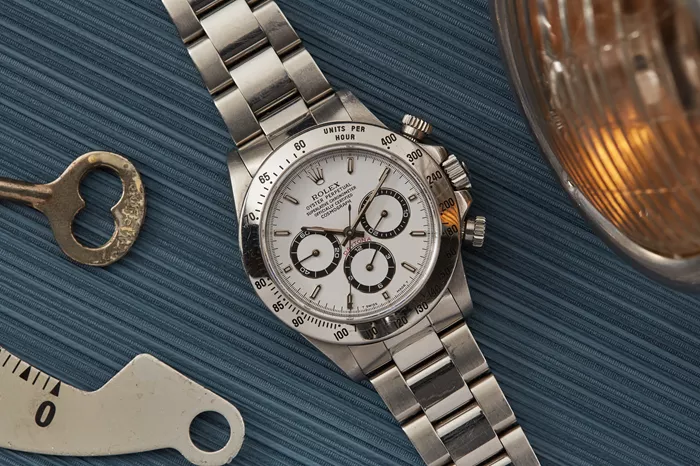The Zenith Daytona is a timepiece that blends history, craftsmanship, and innovation. Known for its association with one of the most famous watches ever made, the Rolex Daytona, the Zenith Daytona carries with it a rich legacy that many watch enthusiasts and collectors admire. In this article, we will explore the origins, design, mechanics, and legacy of the Zenith Daytona, offering an in-depth understanding of what makes this watch a significant part of horological history.
The Origins of the Zenith Daytona
The Role of Zenith in the Rolex Daytona’s Development
The relationship between Zenith and the Rolex Daytona is pivotal in understanding the evolution of the legendary Daytona chronograph. In the early 1990s, Rolex sought to enhance the precision and functionality of its iconic Daytona model. As a result, Rolex turned to Zenith’s El Primero chronograph movement, renowned for its high-frequency and superior performance. This collaboration led to the creation of what is now known as the Zenith Daytona.
The El Primero Movement
The El Primero movement is a crucial part of the Zenith Daytona. Launched by Zenith in 1969, the El Primero was the first high-frequency automatic chronograph movement, beating at 36,000 vibrations per hour. Its precision and innovation made it the perfect foundation for the Rolex Daytona, which utilized the El Primero movement between 1988 and 2000. This period of collaboration is often referred to as the “Zenith Daytona era.”
Design Features of the Zenith Daytona
The Case and Dial
The case of the Zenith Daytona remains true to the classic aesthetic that has defined the Rolex Daytona line for decades. Made from stainless steel, the case typically measures 40mm in diameter, striking a balance between elegance and functionality. The dial is often seen in various configurations, with white, black, and silver being the most common choices. The subdials, which are a hallmark of the chronograph function, are placed symmetrically, giving the watch a balanced and dynamic appearance.
The Chronograph Functionality
The chronograph function on the Zenith Daytona is powered by the El Primero movement. This high-frequency movement allows the watch to measure elapsed time with remarkable accuracy. The subdials on the dial represent hours, minutes, and seconds, with the central chronograph seconds hand sweeping smoothly around the dial.
The Technical Specifications of the Zenith Daytona
Movement and Caliber
The Zenith Daytona is powered by the El Primero 4030 caliber, a derivative of the original El Primero movement. This caliber is equipped with a chronograph complication, a tachymeter scale for measuring speed, and a date function. The movement is housed within the iconic Rolex Oyster case, ensuring water resistance and durability.
Power Reserve and Frequency
One of the standout features of the El Primero movement is its high-frequency rate of 36,000 vibrations per hour, providing greater precision and reducing the risk of time deviations. The Zenith Daytona offers a power reserve of approximately 50 hours, making it suitable for daily wear without the need for frequent winding.
The Zenith Daytona’s Legacy
The Zenith Daytona and Rolex’s Impact on the Watch Industry
The collaboration between Zenith and Rolex during the production of the Zenith Daytona had a lasting impact on the watch industry. Rolex’s decision to incorporate the El Primero movement into the Daytona model showcased the importance of technical innovation and precision in luxury watchmaking. The Zenith Daytona, particularly those produced in the 1990s, became highly collectible, as they were only produced for a limited time.
Collectibility and Market Demand
The Zenith Daytona is widely regarded as a collector’s piece due to its rarity, history, and the fact that it represents a unique period in the Daytona’s production. Watches produced with the El Primero movement are often more sought after than those with Rolex’s in-house movements. As a result, the Zenith Daytona continues to enjoy high demand among collectors and investors alike.
Comparing the Zenith Daytona to Other Daytona Models
Zenith Daytona vs. Modern Rolex Daytona
The modern Rolex Daytona, which features Rolex’s in-house chronograph movement, has evolved significantly since the Zenith Daytona era. While the modern Daytona boasts impressive technical features and a refined design, the Zenith Daytona holds a special place in the hearts of enthusiasts due to its connection to the El Primero movement and its limited production run. Collectors often debate which version is superior, but the Zenith Daytona remains a coveted piece for its unique history.
Zenith Daytona vs. Vintage Rolex Daytona
The Zenith Daytona also stands out when compared to vintage Rolex Daytonas that predate the collaboration with Zenith. While these earlier models feature Rolex’s in-house movements, the Zenith Daytona offers a different level of technical innovation with the El Primero movement. Collectors often find themselves drawn to the Zenith Daytona for its technical sophistication and the story behind the movement inside the watch.
Conclusion
The Zenith Daytona is a remarkable timepiece that occupies a special place in the history of horology. With its rich legacy, technical prowess, and unique connection to Rolex, it remains a beloved watch among collectors and enthusiasts. The collaboration between Zenith and Rolex produced a chronograph that is not only functional but also represents a key moment in the evolution of the Rolex Daytona. Whether you’re a seasoned collector or a newcomer to the world of luxury watches, the Zenith Daytona is a timepiece worth learning about and appreciating.


